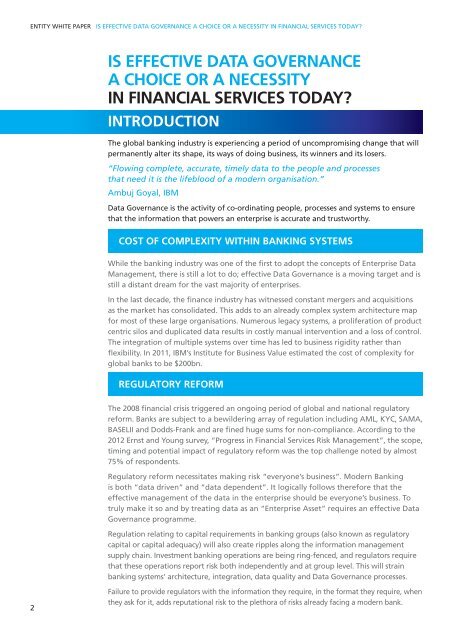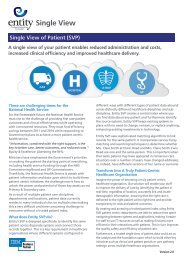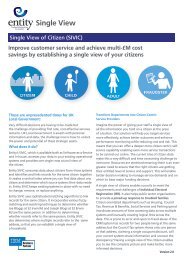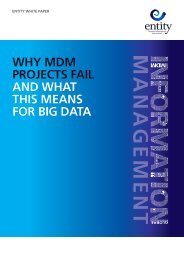MDM_Whitepaper_EDG_Finance
Create successful ePaper yourself
Turn your PDF publications into a flip-book with our unique Google optimized e-Paper software.
ENTITY WHITE PAPER IS EFFECTIVE DATA GOVERNANCE A CHOICE OR A NECESSITY IN FINANCIAL SERVICES TODAY?<br />
IS EFFECTIVE DATA GOVERNANCE<br />
A CHOICE OR A NECESSITY<br />
IN FINANCIAL SERVICES TODAY?<br />
INTRODUCTION<br />
The global banking industry is experiencing a period of uncompromising change that will<br />
permanently alter its shape, its ways of doing business, its winners and its losers.<br />
“Flowing complete, accurate, timely data to the people and processes<br />
that need it is the lifeblood of a modern organisation.”<br />
Ambuj Goyal, IBM<br />
Data Governance is the activity of co-ordinating people, processes and systems to ensure<br />
that the information that powers an enterprise is accurate and trustworthy.<br />
COST OF COMPLEXITY WITHIN BANKING SYSTEMS<br />
While the banking industry was one of the first to adopt the concepts of Enterprise Data<br />
Management, there is still a lot to do; effective Data Governance is a moving target and is<br />
still a distant dream for the vast majority of enterprises.<br />
In the last decade, the finance industry has witnessed constant mergers and acquisitions<br />
as the market has consolidated. This adds to an already complex system architecture map<br />
for most of these large organisations. Numerous legacy systems, a proliferation of product<br />
centric silos and duplicated data results in costly manual intervention and a loss of control.<br />
The integration of multiple systems over time has led to business rigidity rather than<br />
flexibility. In 2011, IBM’s Institute for Business Value estimated the cost of complexity for<br />
global banks to be $200bn.<br />
REGULATORY REFORM<br />
The 2008 financial crisis triggered an ongoing period of global and national regulatory<br />
reform. Banks are subject to a bewildering array of regulation including AML, KYC, SAMA,<br />
BASELII and Dodds-Frank and are fined huge sums for non-compliance. According to the<br />
2012 Ernst and Young survey, “Progress in Financial Services Risk Management”, the scope,<br />
timing and potential impact of regulatory reform was the top challenge noted by almost<br />
75% of respondents.<br />
Regulatory reform necessitates making risk “everyone’s business”. Modern Banking<br />
is both “data driven” and “data dependent”. It logically follows therefore that the<br />
effective management of the data in the enterprise should be everyone’s business. To<br />
truly make it so and by treating data as an “Enterprise Asset” requires an effective Data<br />
Governance programme.<br />
Regulation relating to capital requirements in banking groups (also known as regulatory<br />
capital or capital adequacy) will also create ripples along the information management<br />
supply chain. Investment banking operations are being ring-fenced, and regulators require<br />
that these operations report risk both independently and at group level. This will strain<br />
banking systems’ architecture, integration, data quality and Data Governance processes.<br />
2<br />
Failure to provide regulators with the information they require, in the format they require, when<br />
they ask for it, adds reputational risk to the plethora of risks already facing a modern bank.







